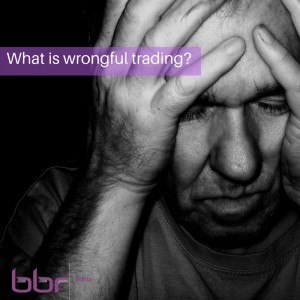What is wrongful trading?

Wrongful trading is a type of civil wrong found in UK insolvency law, under Section 214 Insolvency Act 1986. It was introduced to enable contributions to be obtained for the benefit of creditors from those responsible for mismanagement of the insolvent company.
However a director doesn’t necessarily have to be aware that they were wrongfully trading or even profit from it but ignorance is no defence.
Read our guide below on Wrongful trading.
Wrongful Trading Guide
Wrongful trading Section 214 Insolvency Act 1986.
A director (or shadow or de facto director) of the company may be found liable for wrongful trading if he or she know or ought to have known that there was no reasonable prospect of the company avoiding insolvent liquidation, and from that point, failed to take every step to minimise the loss to creditors.
Dishonesty is not necessary nor does the director need to have profited from the wrongful trading.
If a director is found to have been wrongfully trading he or she can be required to contribute to the assets of the company personally, the amount being decided by the court.
In addition, disqualification proceedings may be brought against a director by the Insolvency Service. A director who is deemed by the Court to be unfit may be disqualified from being a director for a period of up to 15 years.
To avoid liability for wrongful trading directors must show that they took every step possible to minimise the potential loss to creditors.
They will be judged according to the following tests:
- What a competent director in his or her position should have known and the actions they should have taken (objective test).
- The individual directors’ actual knowledge and actions (subjective test).
This means that a financial director will be assumed to have a higher level of specialist finance, skill and experience that of a sales director.
Managing directors will also be assumed to have high levels of skill and responsibility.
Liability for wrongful trading will only arise if the company’s creditors are worse off as a result of the continuation of trading. Directors may consider that the company can trade back to solvency and in certain circumstances the decision to continue trading may be justified.
However in such situations directors should take expert financial and legal advice.
Taking such expert advice will make it easier for a director to prove that they acted responsibly.
Other things that directors should do to protect themselves include:
- Analyse the company’s financial position on a regular basis.
- Hold regular board meetings to discuss the performance of the business and keep minutes of decisions taken.
- Avoid taking additional credit from suppliers.
- Overall act in the best interest of creditors.
Other provisions of the Insolvency Act 1986 of which directors should be aware are:
Fraudulent Trading – Section 213
Preferences – Section 239 of the Insolvency Act 1986
Transactions at undervalue – Section 238 Insolvency Act 1986